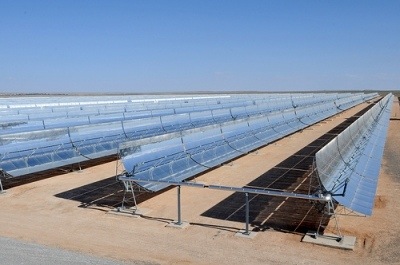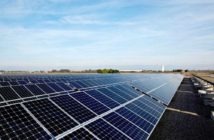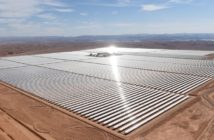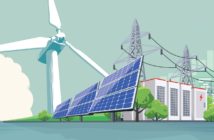GLOBAL ARAB NETWORK
Mohammed Almasri
 Two public-private partnerships (PPPs) are in the works to develop Morocco’s wind and solar energy sector, a positive step toward the realisation of the country’s ambitious renewable energy programmes.
Two public-private partnerships (PPPs) are in the works to develop Morocco’s wind and solar energy sector, a positive step toward the realisation of the country’s ambitious renewable energy programmes.
The Moroccan electricity provider, Office Nationale de l’Électricité (ONE), awarded a contract in April for the construction of a 150-MW wind farm to a consortium of EDF Energie Nouvelles (EDF EN), the French company’s renewable energy arm, and Japan’s Mitsui. The two companies will be responsible for the financing, design and construction of the wind farm, located 12 km northwest of Taza. The project will be structured as a build-own-operate-transfer contract, including a 20-year agreement for ONE to purchase the electricity produced.
The Taza wind farm, expected to launch operations in 2014, is the first step in Morocco’s Wind Energy Programme, which has set a goal of reaching 1000 MW of wind energy capacity by 2015 and 2000 MW by 2020. In addition to state financing, the Wind Energy Programme has also received funds from the African Development Bank and the global Clean Technology Fund. The European Investment Bank and the German banking group KFW have also reportedly expressed interest in participating.
The second phase of the Wind Energy Programme calls for the creation of an additional five wind farms with a collective installed capacity of 850 MW to meet the 2015 target. These wind farm projects will also be structured as PPPs.
Companies have already been invited to submit bids to pre-qualify for future wind energy projects under the second phase of the Wind Energy Programme. Sixteen companies submitted proposals that went under review in late June. Results are expected to be announced in the third quarter of 2012, and calls for tender for construction projects will be launched among the pre-qualified candidates by year-end.
Morocco has set the equally ambitious goal of reaching solar energy capacity of 2000 MW by 2020. The Moroccan Agency for Solar Energy (Agence Marocaine de l’Energie Solaire, Masen) is in the final stages of awarding a contract to design, finance and construct a 160-MW solar energy plant near the southern city of Ouarzazate. The Ouarzazate facility is the first such contract under Morocco’s solar plan, which aims to attract $9bn in investment by 2020 to construct five solar energy plants nationwide.
In June, Reuters reported that a government source had confirmed that the Saudi International Company for Water and Power, working in a consortium with the Spanish engineering firm Aries IS and TSK EE, would likely be awarded the $500m contract. However, Masen has yet to release a report of its final decision. Other finalists under consideration are a consortium of Abeinsa ICI, Abengoa Solar, Mitsui and Abu Dhabi National Energy Company, and a consortium of Enel and ACS SCE.
Work is expected to begin on the Ouarzazate facility in the third or fourth quarter of this year and finish in 2016. Masen officials have indicated that the plant’s capacity will be expanded from 160 MW to 500 MW in a second phase, and there are plans in the near-term to launch tenders for a 50-MW photovoltaic module and CSP towers of at least 50 MW at the site.
The government considers developing renewable energy capacity a priority, and it has maintained support for these programmes despite an economic climate impacted by continued economic stagnation in Europe, the country’s main trade partner, and higher levels of public spending. Until the costs of producing solar energy drop, the government has indicated it will cover the difference between Masen’s energy production cost and ONE’s purchase price.
Developing renewable energy solutions is a long-term effort, but one that stands to have a tangible impact on the economy. Morocco imports 90% of its energy needs and faces an average 7% annual rise in domestic energy demand. Imports of fossil fuels have contributed to a heavy trade deficit, which reached Dh84.4bn (€7.7bn) between January and May 2012, up 10% from the same period of 2011.
“The strategy of development of renewable energies is quite relevant. It is not just a choice, it is a necessity,” Ahmed Squalli, the president of the Moroccan Association of Wind and Solar Industries (Association Marocaine des Industries SOLaires et Eoliennes), told OBG.
To realise these projects, Morocco is planning to tap into rising levels of global renewable energy spending. The 2012 Global Trends in Renewable Energy Investment report, published by the UN Environment Programme, noted that global investments in renewable energies, excluding hydroelectricity, climbed 17% year-on-year to reach a record $257bn in 2011, almost double the investment level of five years ago.
While the country’s energy development goals have set a high bar, a series of competitive international tenders and the launch of two anchor projects bode well for the solar and wind sectors in Morocco. (OBG)
Add comment
The opinions of the authors in articles published are theirs alone and do not necessarily reflect the views of Global Arab Network
.






